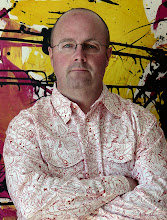 |
| Landscape (C) Tom Tomos 2010 |
(1) Brain states are distinct at any given moment in time
(2) Brain states are different at times t1, t2 ... t n
(3) In virtue of (1) brain states at any time t could be said to be in ‘position’ p
(4) In virtue of (2) and (3) brain states can be said to be in 'positions' p1 at t1, p2 at t2 ... pn at tn.
(5) Substituting these terms into Newton’s standard laws of motion we can obtain equations for ‘velocity’ of brain states and even ‘acceleration’
(6) The equations can be obtained, one from another by standard processes of integration (and differentiation)
(7) Here’s the speculative bit; perhaps consciousness is what ‘drops out’ of the process of integration. Perhaps it is just what the constant of integration is. Another view of the equations would say that the first integration yields consciousness and a second integration yields self-awareness and perception of phenomenal aspects of the world.
(8) I have no idea what the SI units would be!
(9) It seems to me to be a not implausible idea, after all we are aware of our thought processes sometimes ‘speeding up’ and ‘slowing down’
(10) The absolute value of the constant of integration depends on the initial conditions. Perhaps there is a threshold in terms of brain complexity (numbers of neurons*) and the levels at which consciousness and then self-consciousness (including awareness of phenomenal aspects of the world) emerge.
(11) This approach has the advantage of being empirically testable in this world.
(12) There would be implications in this model for 'machine' consciousness and for the consciousness of large 'virtual' machines such as the web.
* See New Scientist 31 July 2010 p.38 'It's not what you've got...' for more on neuron numbers.

